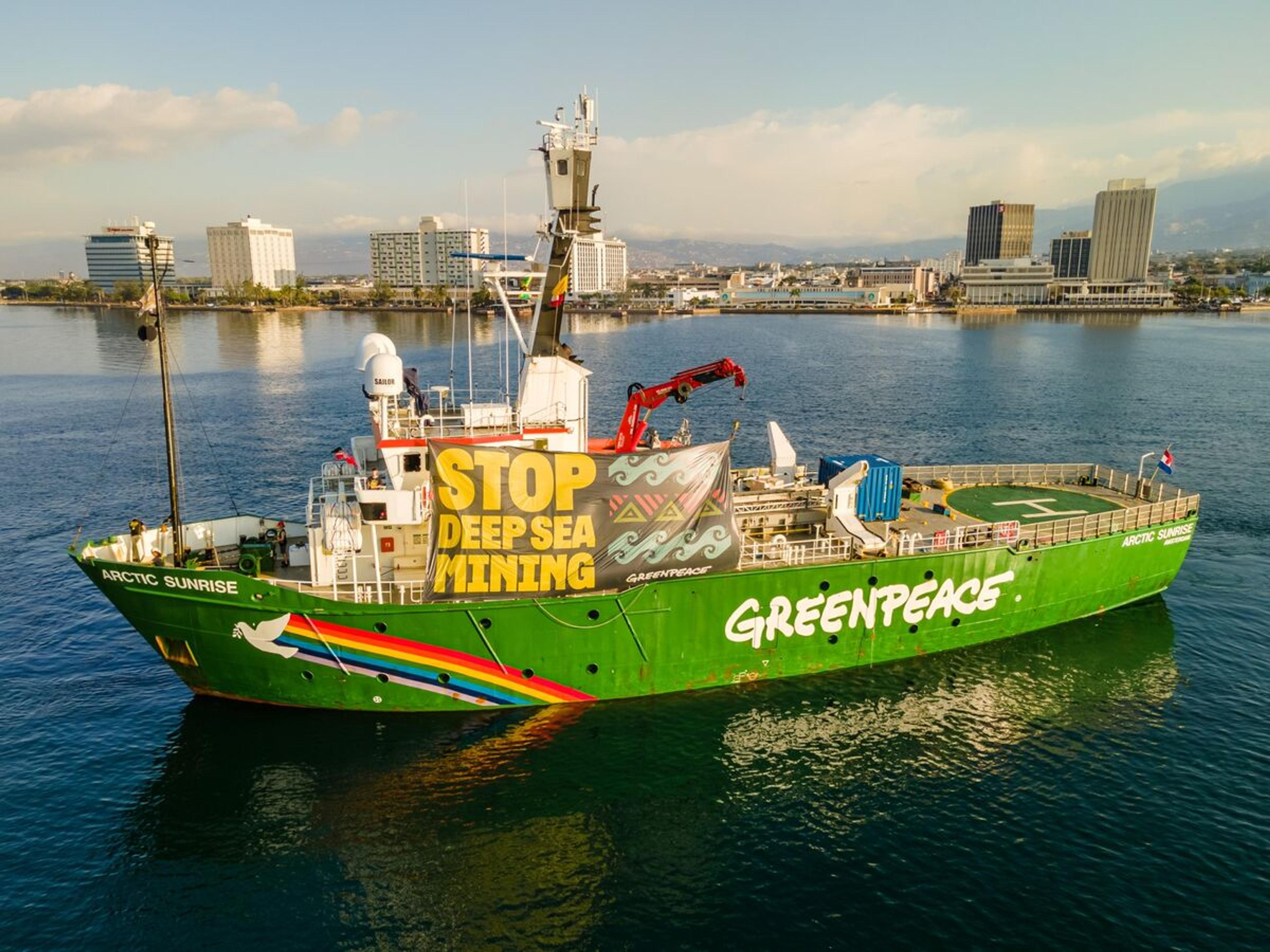

A Greenpeace vessel arrives in Kingston, Jamaica, at the start of the International Seabed Authority meeting in 2023.
Gladstone Taylor/Greenpeace International
Environmental groups say indigenous approach needed when considering seabed mining
Climate change advocates question the impact mineral harvesting will have in New Zealand and the Cook Islands.




Pacific People’s report: Employment rises but housing crisis hurts families




Pacific People’s report: Employment rises but housing crisis hurts families
Climate change advocates warn there are unknown risks when it comes to deep sea mining, and there are calls for a long-term indigenous approach.
This comes following a proposal to mine 5 million tonnes of iron sand each year from the South Taranaki coast, as exploration work around potential seabed mining in the Cook Islands marks two years.
Greenpeace campaigner Juressa Lee (Te Rarawa, Ngāpuhi, Rarotonga) says we should look to Pacific and Māori indigenous ways of living for the answers on how to move forward.
“Our tupuna had the answers and knew how to live on our islands. At the moment, our thoughts are that we need to take things out of the ground, take things out of the seabed, out of the deep sea floor in order to make things and live this very kind of linear life where we just take and take and take from the earth, from the planet, and our ancestors didn't live like that, they lived circular lives.
“We should be looking at recycling and reusing the things that we’ve already drawn from the earth, treasuring them more than we already have and keeping them in use for as long as possible.”
Watch Fili Fepulea’i speak about why Greenpeace is campaigning in south Taranaki against seabed mining:
Dr Teina Rongo is a marine biologist and climate change advisor in the Cook Islands, where the option of seabed mineral harvesting remains a contentious issue.
“There’s so much that we don’t know about the bottom of the ocean. Mining, it doesn’t matter what kind of mining, is detrimental to the environment.”
Minerals like cobalt and manganese are used for batteries and electronics, and Prime Minister Mark Brown says the nodules could be a multi-billion dollar income for the Cook Islands.
Speaking on the PMN Cook Islands programme, Rongo questions whether the potential benefits will outweigh the risks.
“The reason why we're mining, it’s a solution to climate change because the minerals will be used to build these batteries that we need to run our vehicles, so it takes away the reliance on fossil fuel.
“But at what risk? We know that this is an environment that's already under stress, so much stress, and all we're doing is adding more.”
Rongo is chair of the Cook Islands NGO, Kōrero of te'Ōrau, which has actively opposed mining in the Cook Islands. He says people should think about who employs the scientists who have come out in support of seabed mining, but says age is also a factor in differing views.
“There seems to be some conflict between the older generation and the younger generation. The younger generation is not for mining, but the older ones are.”
Legal and political action
In New Zealand, environmental group Greenpeace has been backing local iwi Ngāti Ruanui in opposing the mining proposal in Taranaki.
Speaking to Levi Matautia-Morgan on Pacific Mornings, Lee says how the hearing plays out will have global implications.
“The rest of the world, who want to be deep sea miners will be watching closely.
“As a country who is perceived to do the right thing by the environment, that will embolden this new, emerging industry of deep sea mining.
“Once the door is open, it will be very hard for us to close it, so it’s important that we fight this hard and we stop it before it gets a chance to start.”
There are concerns the proposal will be fast-tracked under the new coalition government, which Lee says will leave little room for feedback from local iwi or expert consultation.
“My concern is that they're really kind of putting all the eggs in that fast-track basket and that they're not going to do anything to ensure that what they do down there, if they get the go-ahead, will offer any protection to any of those species, or to any of the biodiversity in the ocean and the people who live there.”
Meanwhile, 25 countries, including Pacific nations have asked for a moratorium on mining while further research is carried out.
Lee says we should be protecting the ocean and environment for future generations, and putting this before short-term economic interests.
“What I’ve learned from my tupuna is how to live in order to make sure that there is a safe place for my grandchildren’s grandchildren, and to bring me back to thinking about what is the most sustainable thing, because we can’t spend money on a dead planet.”
Watch the full interview with Juressa Lee on Pacific Mornings here: